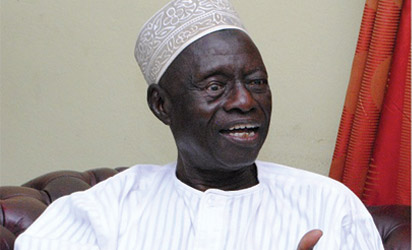
A group of elder statesmen from the North Eastern region have called on President Goodluck Jonathan to cease the State of Emergency order in Yobe, Adamawa and Borno.
Chairman of the Board of Trustees of the North East Forum For Unity and Development, Mallam Adamu Ciroma, and his delegation informed President Jonathan of their position after a closed door meeting with the Commander in Chief in Aso Rock.
Their position was contained in a speech obtained by journalists in Abuja.
Their statement said, “The abduction of the over 230 Chibok schoolgirls and the callous way this dastardly act is being handled by some highly placed officials of the Federal Government, the ruling party and even the wife of the President are a matter of surprise and worry to the generality of Nigerians.
“One begins to wonder how this real tragedy has been perceived with high degree of official doubt and ambivalence that it is taking the Federal Government over three weeks to set up a committee to authenticate this.
“This insurgency, we believe, is not religious, ethnic or political, but an extension of international terrorism on our fatherland which has concomitant negative effect on our national, regional and global economic survival and performance.”
Recommendations made to President Jonathan by the Northern elders include:
• Government re-examine its capacity to tackle this tricky and deteriorating security situation.
• Government to drop the idea of renewing the state of emergency in Adamawa, Borno and Yobe States and to put in place more efficient and stringent security measures, effective intelligence and the introduction of high technologies in nipping the crisis in the bud by utilising balloon technology, drones, satellites and other technologies etc. Meanwhile, the FG should issue White Paper on the following committees’ reports which should be implemented as soon as possible in order to bring the insurgency to an end.
i. Gaji Galtamani Committee
ii Sheik Ahmed Lemu Committee
iii Alhaji Kabir Turaki Dialogue and Reconciliation Committee.
* Government to ensure robust community relations and participation in the security, rescue and rehabilitation operations in the area.
* Government to ensure that the Chibok School girls are quickly and safely rescued, rehabilitated and reunited with their families within a pre-determined time frame.
* In order to raise the confidence and morale of the citizens, the President in a high-powered delegation of his cabinet and security operatives should visit Chibok/Izge, Buni Yadi and Bama as soon as possible (immediately) in the manner that he visited Nyanya and to make strong positive statements there with regard to the rescue operations, rehabilitation/compensation and re-integration.
* The government to genuinely investigate all cases of human rights abuses, extra-judicial killings, tortures, slippages/escape from detention etc and bring the culprits to justice.
* The Federal Government to consider and assist the state governments strongly in the immediate rehabilitation and securing of the affected schools, colleges and critical infrastructure in the area, so that our children will safely and confidently go back to school to reverse the already backward status of the region in the Human Development Indices.
* The state governments in the sub region particularly the three under emergency rule ones to be offered some respectable and reasonable monetary compensation to offset their expenditure on security which is mainly a federal preserve-thus putting them in a disadvantaged position in the regional development indices amongst other states of the federation.
* While acknowledging the constitution and the reconvening of the Continuing Dialogue Committee by the Federal Government, we urge the government and the committee to seek and utilise various civic and civil ways to achieve comprehensive solution to the insurgency.
This can be achieved by resorting to notary stakeholders, traditional institutions, faith/community based organisations and the civil society to provide local intelligence and other necessary information.


Leave a Reply